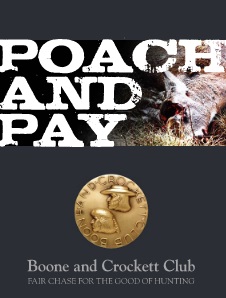 The Boone and Crockett Club today released the results of a two-year research study on the illegal take of wildlife. The research findings were recently shared with conservation and law enforcement attendees at the 83rd North American Wildlife and Natural Resources Conference held in Norfolk, Virginia, hosted by the Wildlife Management Institute.
The Boone and Crockett Club today released the results of a two-year research study on the illegal take of wildlife. The research findings were recently shared with conservation and law enforcement attendees at the 83rd North American Wildlife and Natural Resources Conference held in Norfolk, Virginia, hosted by the Wildlife Management Institute.
“The business of conservation comes with a few things we’d just as soon not have to deal with, but we must, and poaching is one of them,” said Ben B. Hollingsworth Jr., president of the Boone and Crockett Club. “This is one of those issues that is best addressed at the state level, but before effective improvements can be made, we needed a view from the national level.”
Funded through a partnership between the Boone and Crockett Club and American sporting optics maker Leupold & Stevens, the “Poach and Pay” research program polled state fish and wildlife agencies, as well as law enforcement personnel. The process uncovered many findings that will be beneficial, from learning the values people place on game species to stronger deterrents and penalties, to more successful prosecution of violators.
“A few things stand out in our research,” Hollingsworth Jr. explained. “The first is that the fine men and women who enforce our game laws are committed to protecting our wildlife from illegal take, but in many cases the system is failing them and us.”
The research shows that wildlife crimes are more often dismissed or fines reduced to free up a legal process that is backlogged prosecuting more “higher priority” crimes. It also shows that judges and prosecutors often do not have all the information or training they need to understand the costs involved with the theft of wildlife from poaching and just how many people care about wildlife conservation and management.
“We’re seeing creative ways some states use to deter poaching, like using the Boone and Crockett scoring system to access higher fines for the taking of a trophy-class animal,” said Hollingsworth Jr. “I was most impressed with what states like South Dakota are doing to turn a negative into a positive.”
South Dakota incorporated a provision requiring that a percentage of the poaching penalties go to the school district in the locale where an animal was illegally taken. The agency receives the base amount fine and the school district gets the trophy restitution portion to offset operating costs like books and new computers.
“Poaching is a crime committed by thieves – not sportsmen,” Hollingsworth Jr. concluded. “We appreciate our friends at Leupold for making this project possible and all the cooperation we received from wildlife officials who helped us pull together real data our state agencies and legal system can now use to more effectively drop the hammer on poaching.”
The full Poach and Pay report can be read at this link.
